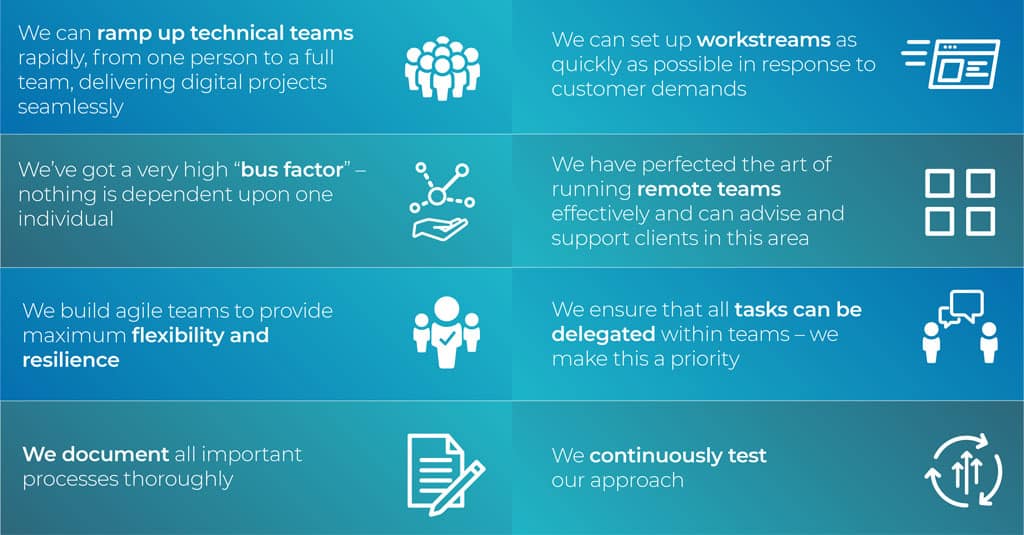
Five key factors your team should be considering
The current outbreak of COVID-19 has caused disruption and uncertainty to a large number of industries globally, meaning an agile, flexible approach to operation has transitioned from being a nicety to a necessity within days. Businesses of all sizes in every sector have adopted a remote way of working – many are balancing the fluctuating, unpredictable demand of consumers with unreliable supply chains and/or workforce availability.
There’s no doubt that this macro-economic crisis will have an immeasurable impact on businesses. At Softwire, we’ve built our support team to provide maximum resilience and flexibility to enable us to spin up new workstreams as quickly as possible in response to customer demand. This, as it turns out, has ensured that we are well-equipped to tackle the various challenges that come with a global pandemic.
We have established our internal processes to have a very high “bus factor” meaning nothing is ever dependent on one person. In addition, we have long-since been set-up for remote working, meaning we can make use of whoever is free and wherever they’re based to maximise efficiency at all times. We’ve been exploring how we can best support our clients during this time, working with agility and flexibility to continue to deliver to demand. We’ve created a few top tips for those struggling to adjust to this new way of working.
1. Measure your bus factor
Keep your internal teams running smoothly by keeping track of the various tasks your team are working on. Be vigilant with communication and ensure project management tools are kept up to date with who’s working on X and who’s running Y to ensure all deadlines can continue to be met in the usual manner. Keep track of who is proficient at each activity, who’s already learning it and who wants to learn it to ensure you have enough internal resource in the event of staff unavailability.
2. Make delegation a priority
If you’re the best-placed person to perform a task, that probably means you shouldn’t be doing it. Consult your list from the tip above and see who needs to learn how to complete this activity. You can then ask them to do it under your guidance, watch you do it or act as a second pair of eyes via a virtual screen share. Equip your workforce with the skills and knowledge they need to keep basic operations going.
3. Abhor ramp up costs
Document important processes thoroughly to ensure that the most important things are always at the top of the to-do list. This may mean that lengthy setup activities are reduced so as to allocate your resource in accordance with business needs.
4. Delegate (again)
Delegation is vital to maintaining business as usual – or as much as it can be. If you’re doing it right, you’ll find that instead of senior staff flat out on critical tasks and junior staff twiddling thumbs, waiting to be unblocked, you’ll have the less senior members of your team driving the day-to-day business forward. This gives senior team members the time to drop into where they’re needed whilst focusing on next steps and strategy.
5. Be flexible with staff
If you’re asking your staff to be super-flexible, ensure that you are prepared to be super flexible in return. If they need to take annual leave at short notice, regard it not as a blocker but a test of your team’s resilience. If everything collapses because one member is away from the office for one day, how will you cope with a real emergency, like a nationwide quarantine?
Infographic – Softwire’s approach



